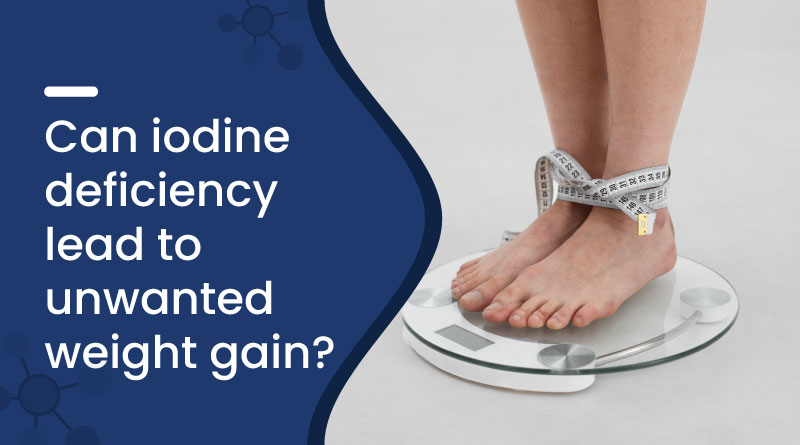Can Iodine Deficiency Cause Weight Gain? Know the Link Today


Iodine deficiency is a common but often ignored nutritional issue. But did you know that a lack of iodine may contribute to unwanted weight gain? Iodine plays a major role in maintaining thyroid function, which directly influences your metabolism. In this blog, we’ll explore how iodine affects weight, signs of deficiency, and what you can do to maintain healthy iodine levels.
What Is Iodine and Why Does the Body Need It?
Iodine is a trace mineral that your body needs to produce thyroid hormones—T3 (triiodothyronine) and T4 (thyroxine). These hormones regulate metabolism, energy production, body temperature, and even heart rate.
Without enough iodine:
- The thyroid gland can’t make sufficient hormones.
- This leads to hypothyroidism, where metabolism slows down.
- A slower metabolism can result in fat accumulation and weight gain.
How Does Iodine Deficiency Affect Metabolism?
Low iodine reduces thyroid hormone production. As a result:
- Calorie burning slows down
- Energy levels drop
- Fat storage increases
This makes it easier to gain weight even with normal eating habits. People with chronic iodine deficiency may also experience cold intolerance, fatigue, and bloating, which further reduce physical activity and worsen weight gain.
Can Iodine Deficiency Directly Cause Weight Gain?
Yes, indirectly. Iodine deficiency doesn’t cause fat gain by itself, but it sets the stage by disrupting thyroid hormone balance. That leads to a chain reaction:
- Low thyroid activity → slow metabolism
- Slow metabolism → fewer calories burned
- Fewer calories burned → weight gain over time
This is especially common in women, who are more prone to thyroid imbalances due to hormonal fluctuations.
What Are the Signs of Iodine Deficiency?
Here are common symptoms to look out for:
- Sudden or unexplained weight gain
- Fatigue and weakness
- Dry skin and hair loss
- Feeling cold all the time
- Swelling in the neck (goiter)
- Irregular periods
- Constipation
If you have more than two of these symptoms consistently, iodine deficiency could be affecting your metabolism.
Who Is Most at Risk of Iodine Deficiency?
Certain groups are more vulnerable to developing iodine deficiency:
- Pregnant and breastfeeding women – due to increased demand
- People on a low-sodium or salt-free diet
- Vegans or vegetarians – who don’t consume dairy or seafood
- People in hilly or inland areas face low soil iodine
- Those who consume non-iodized salt
How Can You Prevent Iodine Deficiency Naturally?
Maintaining a balanced diet is the best prevention strategy. Focus on:
- Iodized salt (but in moderation)
- Dairy products like milk and yogurt
- Seafood such as fish, seaweed, and shrimp
- Eggs
- Whole grains
Avoid excessive consumption of goitrogenic foods (like raw cabbage, broccoli, and soy) as they can interfere with iodine absorption, especially if you’re already deficient.
Can Iodine Supplements Help with Weight Management?
Only if you're iodine deficient. Iodine supplementation helps restore thyroid hormone levels and can indirectly assist with weight normalization. However, excessive iodine intake is harmful and may cause thyroid dysfunction.
Consult a doctor before taking iodine, especially for thyroid issues.
What Is the Recommended Daily Iodine Intake?
| Group | Daily Requirement |
|---|---|
| Adults | 150 mcg/day |
| Pregnant Women | 220–250 mcg/day |
| Lactating Women | 250–290 mcg/day |
Meeting this through food is ideal. Supplement only if advised.
Can Iodine Deficiency Lead to Other Health Issues Beyond Weight Gain?
Yes. If left untreated, iodine deficiency can lead to:
- Goiter (enlarged thyroid)
- Infertility or menstrual irregularities
- Cognitive delays in children
- Depression and mood disorders
- Heart rate abnormalities
Weight gain signals a deeper hormonal issue.
Frequently Asked Questions
Q. Can iodine deficiency cause belly fat?
A. Yes, it can contribute to fat accumulation, especially in the abdominal area, due to slowed metabolism.
Q. How fast can weight normalize after correcting iodine deficiency?
A. If iodine levels are restored and thyroid function improves, some people may notice gradual weight loss within a few weeks to months.
Q. Is using iodized salt enough to prevent weight-related thyroid issues?
A. For most people, yes. But in certain cases like pregnancy or restricted diets, additional sources may be necessary.
Q. Are thyroid-related weight issues permanent?
A. No. With proper diagnosis and treatment, including iodine repletion, metabolism and weight can stabilize over time.
Q. Can children gain weight due to iodine deficiency?
A. Yes. In children, iodine deficiency may lead to stunted growth, cognitive delays, and excess weight gain due to thyroid imbalance.
Conclusion
Iodine deficiency can lead to unwanted weight gain by disrupting thyroid hormone production and slowing down metabolism. If you’re gaining weight without any clear reason and also experiencing fatigue, dry skin, or cold sensitivity, iodine might be the missing link. A balanced diet rich in iodine, awareness of early symptoms, and timely medical advice can help maintain hormonal balance and a healthy weight.
Protein Hydrolysate 10% (16.67 gm) + Dibasic Calcium Phosphate (750 mg) + Phosphorous (580 mg) + Pyridoxine Hydrochloride (1.67 mg) + Cyanocobalamin (3.33 mcg) + Vitamin D3 (333.33 IU) + Niacinamide (50 mg) + Calcium Pantothenate (16.67 mg) + Folic Acid (1 mg) + Zinc Sulphate Monohydrate Eq. to Elemental Zinc (1.67 mg) + Ferric Ammonium Citrate Eq. to Elemental Iron (25 mg) + Manganese Sulphate (5 mg) + Magnesium Oxide (13.33 mg) + Anhydrous Copper Sulphate (8.33 mg) + Chromium Chloride Eq. to Elemental Chromium (83.33 mcg) + Selenium Dioxide Monohydrate Eq. to Elemental Selenium (66.67 mcg) + Potassium Chloride (16.67 mg) + Sodium Chloride (110 mg) + Potassium Iodide Eq. to Elemental Iodine (333.33 mcg) + Excipients (q.s.)
200gm powder in jar
Protein Hydrolysate 10% (16.67 gm) + Dibasic Calcium Phosphate (750 mg) + Phosphorous (580 mg) + Pyridoxine Hydrochloride (1.67 mg) + Cyanocobalamin (3.33 mcg) + Vitamin D3 (333.33 IU) + Niacinamide (50 mg) + Calcium Pantothenate (16.67 mg) + Folic Acid (1 mg) + Zinc Sulphate Monohydrate (1.67 mg) + Ferric Ammonium Citrate (25 mg) + Manganese Sulphate (5 mg) + Magnesium Oxide (13.33 mg) + Anhydrous Copper Sulphate (8.33 mg) + Chromium Chloride (83.33 mcg) + Selenium Dioxide Monohydrate (66.67 mcg) + Potassium Chloride (16.67 mg) + Sodium Chloride (110 mg) + Potassium Iodide (333.33 mcg) + Excipients (q.s.)
200gm powder in jar
Ginseng Extract (42.5 mg) + Vitamin A (2500 IU) + Vitamin B1 (1 mg) + Vitamin B2 (1.5 mg) + Vitamin B3 (10 mg) + Vitamin B5 (5 mg) + Vitamin B6 (1 mg) + Vitamin B12 (0.001 mg) + Vitamin C (50 mg) + Vitamin D3 (200 IU) + Vitamin E (5 mg) + Folic Acid (0.15 mg) + L-Arginine (25 mg) + Calcium (75 mg) + Phosphorus (58 mg) + Ferrous Fumarate (30 mg) + Zinc (10 mg) + Magnesium (3 mg) + Potassium (2 mg) + Manganese (0.5 mg) + Copper (0.5 mg) + Iodine (0.1 mg) + Carbohydrate (100 mg) + Protein (20 mg) + Fat (380 mg) + Energy (4.23 kcal)
15 Capsules in 1 strip
Ginseng Extract (42.5 mg) + Vitamin A (2500 IU) + Vitamin B1 (1 mg) + Vitamin B2 (1.5 mg) + Vitamin B3 (10 mg) + Vitamin B5 (5 mg) + Vitamin B6 (1 mg) + Vitamin B12 (0.001 mg) + Vitamin C (50 mg) + Vitamin D3 (200 IU) + Vitamin E (5 mg) + Folic Acid (0.15 mg) + L-Arginine (25 mg) + Calcium (75 mg) + Phosphorus (58 mg) + Ferrous Fumarate (30 mg) + Zinc (10 mg) + Magnesium (3 mg) + Potassium (2 mg) + Manganese (0.5 mg) + Copper (0.5 mg) + Iodine (0.1 mg) + Carbohydrate (100 mg) + Protein (20 mg) + Fat (380 mg) + Energy (4.23 kcal)
15 Capsules in 1 strip
Vitamin A (1600 IU) + Vitamin E Acetate (1 IU) + Vitamin D3 (100 IU) + Vitamin B1 (1 mg) + Vitamin B2 (1 mg) + Vitamin B6 (0.5 mg) + Vitamin B12 (0.0005 mg) + Calcium Pantothenate (1 mg) + Niacinamide (15 mg) + Calcium (75 mg) + Phosphorus (58 mg) + Folic Acid (0.05 mg) + Copper Sulphate (0.045 mg) + Iodine (0.075 mg) + Potassium (1 mg) + Magnesium (1 mg) + Manganese (0.5 mg) + Sodium Molybdate (0.1 mg)
10 Capsules in 1 Strip
Omega-3 Fatty Acids (EPA 90 mg + DHA 60 mg) + Green Tea Extract (10 mg) + Ginseng (42.50 mg) + Ginkgo Biloba Extract (10 mg) + Grape Seed Extract (15 mg) + Glutathione (10 mg) + Lactic Acid Bacillus (500 Lacs Spores) + Citrus Bioflavonoids (20 mg) + Natural Mixed Carotenoids (11.33 mg, 10%) + Vitamin D3 (200 IU) + Wheat Germ Oil (25 mg) + Vitamin K1 (10 mcg) + Vitamin B6 (1 mg) + Vitamin B12 (1 mcg) + Thiamine (1.4 mg) + Niacinamide (18 mg) + Ascorbic Acid (40 mcg) + Folic Acid (120 mcg + 30 mcg) + Choline Hydrogen Tartrate (25 mg) + Lutein (250 mcg, 10%) + Piperine (5 mg) + Calcium (20 mg) + Phosphorous (15.45 mg) + Iron (10 mg) + Zinc (12 mg) + Iodine (120 mcg) + Magnesium (30 mg) + Manganese (1.5 mg) + Copper (0.5 mg) + Chromium (50 mcg) + Molybdenum (25 mcg) + Selenium (20 mcg) + Potassium (4 mg) + Chloride (3.6 mg) -
15 Capsules in 1 strip
Recent Blogs
Disclaimer : Zeelab Pharmacy provides health information for knowledge only. Do not self-medicate. Always consult a qualified doctor before starting, stopping, or changing any medicine or treatment.






















 Added!
Added!